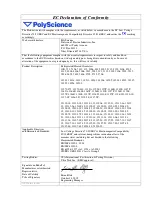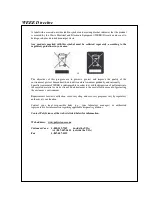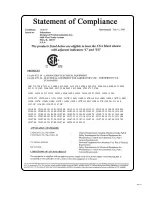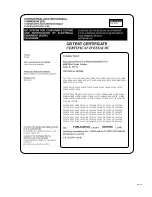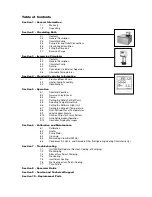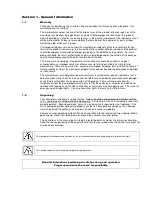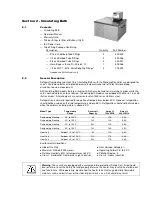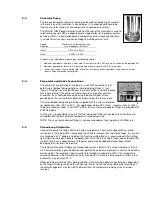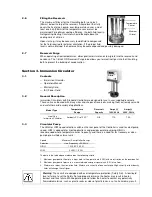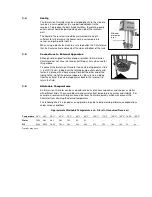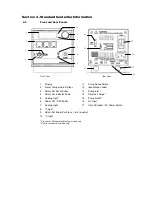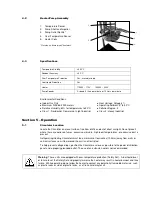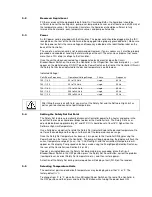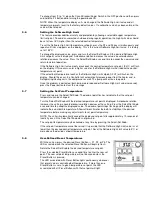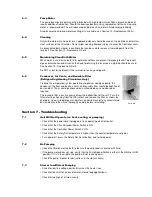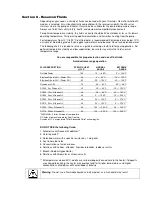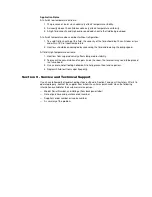
2.3
Circulator Pump
The two-speed simplex (pressure) pump may be used for tempering of samples
in the reservoir or for circulation in closed loops. It is not designed for pumping
from the circulator's reservoir into and out of a second open reservoir.
The HIGH or LOW Speed Selection Switch on the rear of the Controller is used to
select pump speed. LOW is adequate for most applications and provides quieter
pumping. HIGH is recommended where temperature varies frequently and there
is a need for fast recovery or when pumping to multiple external units.
Speed
Maximum Pump Outlet Ratings
Selection
Line Frequency = 50/60Hz
HIGH
15 LPM / 2.6 PSI
LOW
9 LPM / 1.5 PSI
The data in the table above are based on the following criteria:
1. Maximum pump outlet flow rate is measured in liters per minute (LPM) with no restriction on the pump outlet.
2. Maximum pump outlet pressure is measured in pounds per square inch (PSI) at no flow.
3.
Water was used as the circulation fluid. Water has a viscosity of one centistoke. High viscosity or low-
density fluids will change these figures.
2.4
Pump Inlet and Outlet Connections
The pump inlet and outlet ports are female ¼ inch NPT connections that
permit use of barbed tubing adapters or hard plumbing fittings. ½ inch
(13mm) ID tubing may also be slid over these connections and held in place
with a hose clamp. If the pump inlet and outlet are not used for external
circulation, they should be connected using the Buna N Bypass Hose
provided with the unit in order to optimize fluid mixing within the reservoir.
The nylon barbed tubing adapter fittings supplied with the unit are intended
for applications from -40°C to 93°C. For applications above 93°C, brass, stainless steel, or Teflon
®
fittings are recommended. ¼ inch NPT to M16 stainless steel male adapter fittings are provided with
all 50Hz models.
It is the user’s responsibility to ensure that the tubing and fittings connected to the Circulator are
compatible with the bath fluid and temperature range being used.
NOTE: The use of quick-connect fittings is not recommended as they typically restrict flow rate.
2.5
Closed Loop Circulation
Connect the pump inlet and outlet to the external apparatus. To maintain adequate flow, avoid
restrictions in the tubing. When connecting the Circulator to more than two closed loops, the use of a
manifold made of "Y" adapters to divide the fluid into multiple banks is recommended. After setting
up multiple closed loops, check for adequate flow at the return manifold of each loop and check that
the bath fluid is at an adequate level. A booster pump may be added to closed loops without
damaging the Circulator’s bath pump.
The temperature control stability of a closed loop system is better at the external apparatus than in
the Circulator reservoir (provided the control point of the apparatus represents a constant load and is
well insulated). For example, if you circulate fluid through a viscometer at 50°C, the temperature
variation observed in the Circulator reservoir may be ±0.2°C while the temperature variation in the
viscometer may be only ±0.1°C.
Although temperature stability is generally better at the external apparatus control point, depending
on the length of tubing used and the efficiency of the insulation, the actual temperature reading at
the external apparatus may be slightly different than the temperature reading at the Circulator
reservoir.


